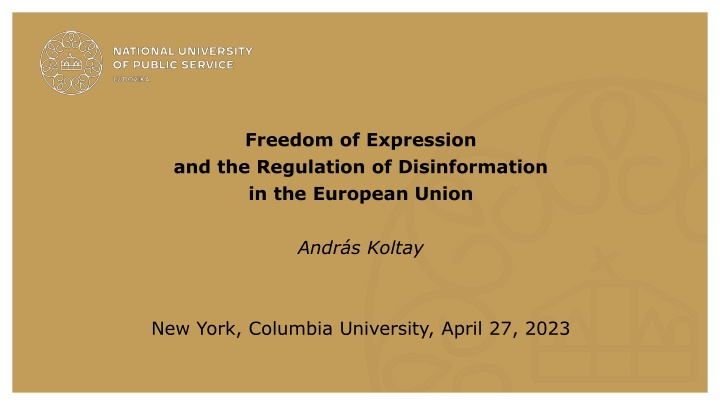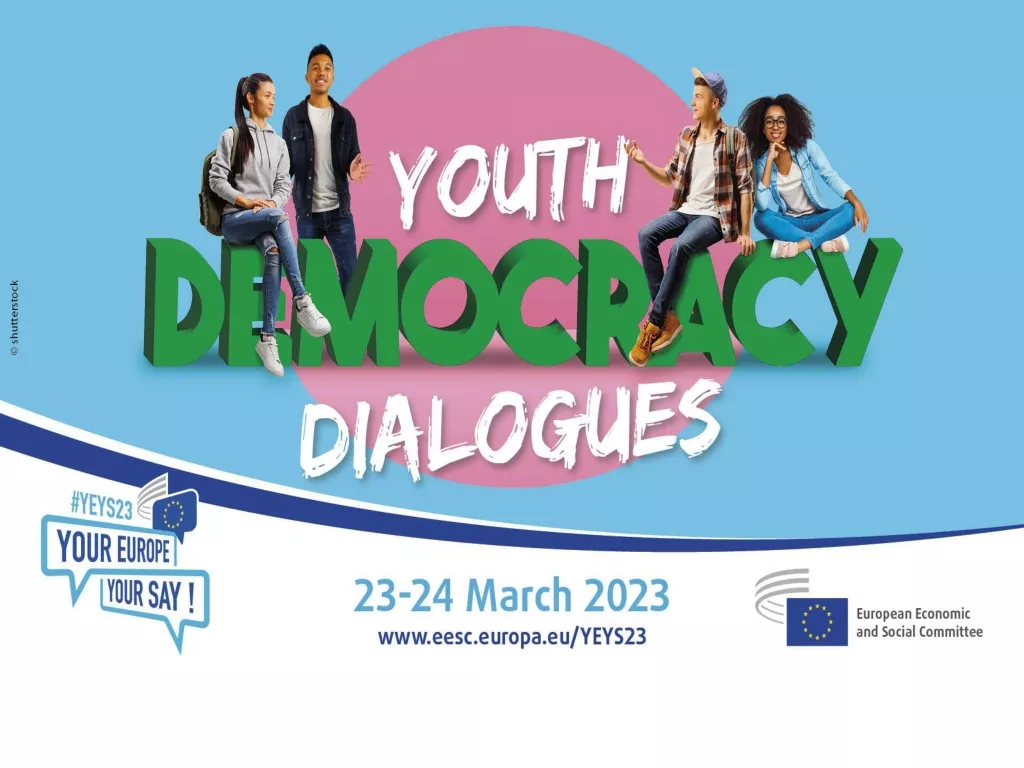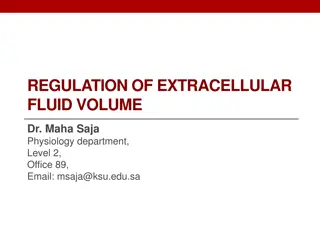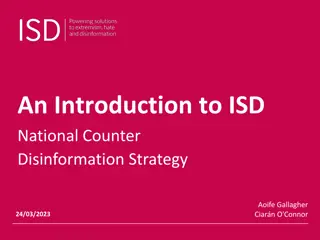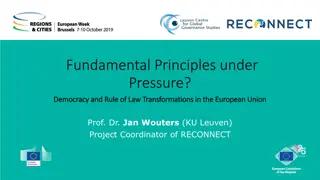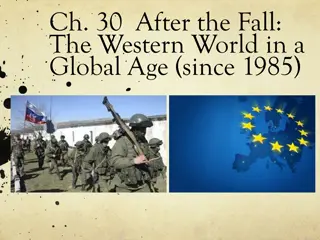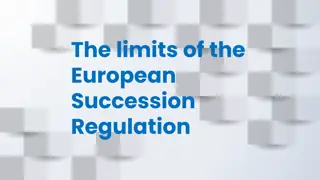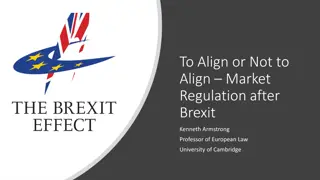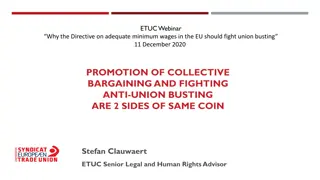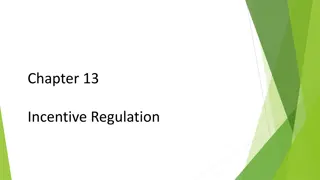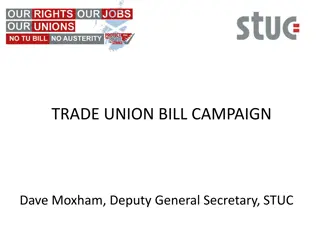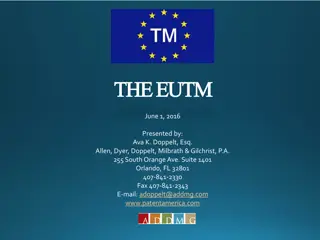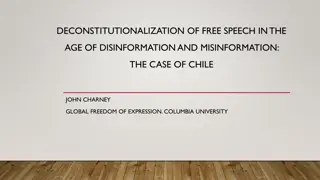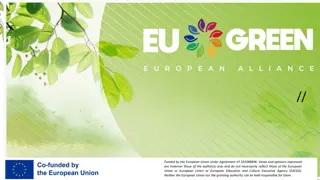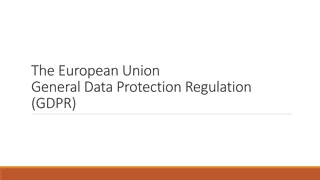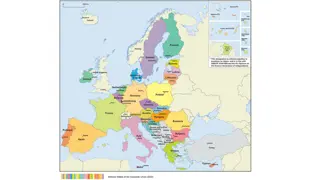Regulation of Disinformation in the European Union: A Comprehensive Overview
The discussion covers the regulation of disinformation in the European Union, focusing on freedom of expression, legitimate restrictions on untruthful speech, media regulation provisions, and the code of practice on disinformation. It delves into key aspects such as hate speech, right of reply, regulation of online platforms, and the strengthened code of practice with detailed commitments and measures. The first experiences of implementing the strengthened code are highlighted, including Google's actions against disinformation disseminators.
Download Presentation

Please find below an Image/Link to download the presentation.
The content on the website is provided AS IS for your information and personal use only. It may not be sold, licensed, or shared on other websites without obtaining consent from the author.If you encounter any issues during the download, it is possible that the publisher has removed the file from their server.
You are allowed to download the files provided on this website for personal or commercial use, subject to the condition that they are used lawfully. All files are the property of their respective owners.
The content on the website is provided AS IS for your information and personal use only. It may not be sold, licensed, or shared on other websites without obtaining consent from the author.
E N D
Presentation Transcript
Freedom of Expression and the Regulation of Disinformation in the European Union Andr s Koltay New York, Columbia University, April 27, 2023
The Legitimate Restrictions on Untruthful or Misleading Speech in Europe defamation law and the protection of reputation and honor prohibition on the denial of crimes against humanity, war crimes and genocides false statements made during election campaigns commercial communication can be regulated in order to protect consumers from false (misleading) statements Scare-mongering (causing harm to the public order by deliberately spreading false information)
Disinformation & Media Regulation Provisions on hate speech The right of reply Due impartiality of news programmes In the UK, the media regulator Ofcom opened 27 investigations against RT. Taking into account a series of breaches by RT of the British broadcasting legislation concerning the due impartiality and accuracy rules, Ofcom revoked these licenses.
The Regulation of Online Platforms EU: notice-and-takedown system (Directive & DSA) Recommendations regarding dis- and misinformation (2018- 2022) Code of Practice on Disinformation (2018, 2022)
The Strengthened Code of Practice on Disinformation The 2022 Code includes 44 commitments and 128 concrete measures in the areas of: demonetization (reducing financial incentives for the disseminators of disinformation), transparency of political advertising (provisions to allow users to better identify political ads through better labelling), ensuring the integrity of services (steps against manipulative behavior such as the use of spam or disinformation), the protection of the integrity of services (e.g., measures to curb manipulative actions such as fake accounts, bot-driven amplification, impersonation and malicious deep spoofing), empowering users through media literacy initiatives, ensuring greater transparency for platforms recommendation systems, supporting research into disinformation, strengthening the fact-checking community.
The Strengthened Code of Practice on Disinformation first experiences The first baseline reports on the implementation of the Code were published in February 2023 Google deprived disseminators of disinformation of 13 million Euro in advertising revenue in the third quarter of 2022 TikTok removed 800,000 fake user accounts, followed by a total of 18 million users during the same period On Facebook, 28 million fact-checking tags were added to different posts
The Digital Services Act of the EU The DSA seeks to protect users freedom of expression. It requires users to be informed of the content removed by platforms and gives them the possibility to have recourse to dispute resolution mechanisms in their own country, as well as to the competent authorities or courts if the platform has infringed the provisions of the DSA These provisions seek to strengthen the position of users by providing procedural guarantees (through bigger transparency, the obligation to give reasons for a deletion of a content or suspension of an account, the right of independent review). Article 14(4), states that the restrictions in the contractual clauses (Article 14(1)) must take into account freedom of expression and media pluralism.
Criticism of the EUs approach to combatting disinformation The EU s approach can help to achieve several objectives. All the related documents avoid a clear assessment of the question of whether the dissemination of disinformation falls within the scope of freedom of expression. Hidden elitism: the EU turns to the elite of the public arena, namely to the traditional media and fact-checking organizations. The lack of honesty: the Code of Practice is a formally self- regulatory instrument, but in reality it is co-regulation imposed by the EU. The Code mainly deals with political advertising.
The EU Decision and the Regulation on Russian media outlets 1 March 2022 Council Decision and Regulation prohibited: operators to broadcast or to enable, facilitate or otherwise contribute to broadcast, any entities or bodies listed in Annex XV, including through transmission or distribution satellite, IP-TV, internet service sharing platforms or applications, installed. content by providers, by means whether the legal such internet new persons, as cable, video- or any pre- All broadcasting licenses or authorization, transmission and distribution arrangements with RT and Sputnik (and later on, other outlets) were suspended. The scope of the measure is unprecedented, as it covers all types of audiovisual media and (as it turned out) social media content. The ban is a departure from the general monitoring ban in Article 15 E- Commerce Directive.
The Problem of Censorship and Prior Restraints The ECtHR does not, in principle, preclude the application of prior restraint. The Regulation does not respond in substance to the question of the prohibition of censorship, but, taking into account the specific circumstances and the content to be prohibited, it is taken for granted that a prior and general restriction is permissible in the present case. This can only be considered compatible with the European approach to media freedom if the other general grounds for the restriction (in particular necessity and proportionality) are well- founded.
The Legitimate Aim of the Ban The EU s argument that RT and Sputnik constitute a significant and direct threat to the public order and security of the Union may justify government interference in application of Article 10(2) of the ECHR and Article 11 of the CFR. the justification on the basis of public order and security is not pertinently convincing, given the limited distribution and impact of the RT and Sputnik broadcasts in most EU countries. There are no indications that RT and Sputnik s programmes actually constitute a serious and immediate threat to public order and security to justify a ban in all EU Member States. (Voorhoof)
The Legitimate Aim of the Ban (2) The recitals of the Decision and the Regulation indicate two reasons for the ban: disinformation and propaganda. The mere fact that speech is objectively false is not sufficient to restrict it. But by producing some specific harms, the spreading of falsehoods by the Russian outlets may fall within the scope of one of the legitimate aims, e.g. public order or national security (spreading of false news undermining public order). The EU could lawfully ban propaganda for war under the regime of the ICCPR, and in line with European human rights instruments. However, it seems that the link of the outlets content with propaganda for war is loose or indirect. The outlets (RT at least) do not clearly advocate for war by providing misleading content; their language is subtle and allusive. False statements made by Russian outlets might fit the concept, but only if such statements incite or encourage the illegal war. Misleading content might not be enough to reach the war propaganda threshold. (Popovic)
The RT France judgment of the General Court of the EU The Court dismissed RT France s application. Nowhere in the judgment is there any mention that the interference at issue was a prior restraint, imposed without a court order or by another independent authority. The judgment also failed to apply ECtHR case law to the question of whether a total ban on broadcasting was proportionate. According to the ECtHR, wholesale blocking of media outlets violated Article 10 to be an extreme measure , which deliberately disregards the distinction between the legal and illegal information , and renders inaccessible large amounts of content which has not been identified as illegal . The Court made no mention of the standards under Article 19 ICCPR, which guarantees freedom of expression. As the Human Rights Committee stated in its General Comment No. 34, restrictions justified under Article 20 must also comply with Article 19(3) . The justification made on the basis of public order, security and integrity is not convincing and very speculative, given the limited distribution and impact of RT France (and the other banned Russian media outlets) in most EU countries.
On the possible future solutions Introducing further restrictions on free speech, as allowed by the European concept of freedom of expression. Cass Sunstein argues that intentional lies, if they cause at least moderate harm, may be constitutionally prohibited and even negligent or mistaken misrepresentations can be restricted, if the harm incurred by them is serious. Online platforms also restrict content that is not legally prohibited, according to their own intentions and contractual terms. The EU encourages restrictions on content that is otherwise protected by freedom of expression, and the relevant documents do not attempt to resolve this contradiction. To make a clear distinction between disinformation originating from governments and dis- or misinformation that comes from members of society, whether deliberate or in good faith. Average users should not be disproportionately restricted in their freedom of expression, even if they approach public debate with malicious intent, and certainly not if they are unaware of the falsity or potential for damage of the news they are spreading (the good faith transmission of government disinformation also falls into this category). Regulating platforms more strictly, setting out their obligations vis- -vis content not protected by freedom of expression, not in self- or co-regulatory instruments but in clearly prescribed legal rules.
On the possible future solutions (2) Users need to be led out of the filter bubble imposed on them by the platforms This would fundamentally affect the business model of the platforms. Making the transmission of opinions on public affairs to users mandatory, or providing easy access to divergent, dissenting views on specific issues, while maintaining the choice for users who do not wish to hear them. The right of reply. The outsourcing of decisions by putting them in the hands of private companies needs to be avoided. Member states and the EU must continue to play a leading role in shaping the rules.
